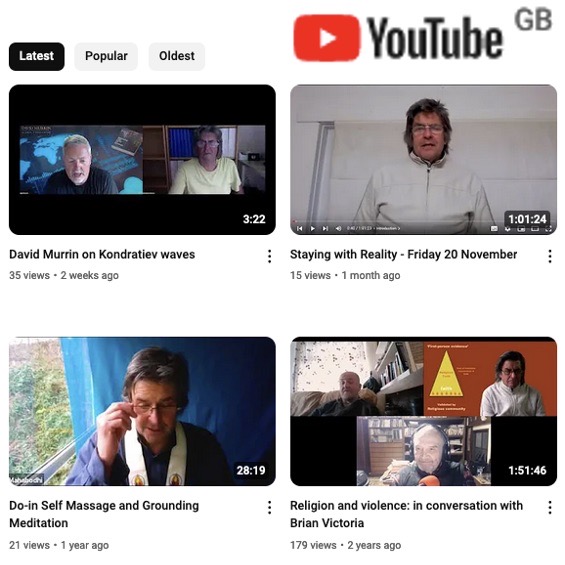Black Lives Matter
Below is an excerpt from my forthcoming book… © Mahabodhi Burton 15 minute read This excerpt is taken from the chapter ‘The Woke Mind Virus‘ and follows on from The Woke Mind Virus post. The origin story of Black Lives Matter (BLM) The term ‘Woke’ came into common usage around the middle of President Obama’s second term, circa 2014. Within the black community it originally signalled, ‘to stay alive to sensitive social issues, including racism.’ However, after the shooting of Michael Brown,[1] an African American teenager by a police officer in Ferguson, Missouri that year, the term came to be popularized by BLM activists seeking to raise awareness about police shootings of African-Americans.[2] Since that date, similar incidents have continued to occur, in what Michael Mascarenhas, speaking in 2022, puts down to ‘environmental racism:’ ‘The fatal encounters of George Floyd, Ahmaud Arbery, and Trevyon Martin, to mention only three of the thousands of deaths of people of colour at the hands of White people each year is a form of environmental racism. Their crime was being in the wrong place at the wrong time. The death of Treyvon Martin was in part normalized because a Black teenage boy was walking in a White gated neighbourhood. Before fatally shooting the Black teenager, White neighbourhood watch captain George Zimmerman called 911 and reported a suspicious person in the neighbourhood. Similarly, Eric Garner was simply standing in front of a beauty supply store on Bay Street in Tompkinsville, Staten Island, when he was approached by New York Police Department police officers and strangled to death. Similarly, the deaths of Michael Brown in Ferguson, Missouri; Walter Scott in North Charleston, South Carolina; Freddie Gray in Baltimore, Maryland; and Philando Castile in Falcon Heights, Minnesota, represent just a few more tragic examples of over policing in Black and Brown communities. When found in White spaces, the colour of one’s skin is a key determinant of their experience. The Amy Cooper incident, where a White woman who called the police on Christian Cooper, a Black man, in Central Park, New York, after he asked her to leash her dog is one of the most recent striking examples of this form of environmental racism. Moreover, in most of these fatal cases–the coroner ruled Eric Garner’s death a homicide– predominantly White juries failed to bring charges against the White offenders. In fact, one of the potential jurors in the Treyvon Martin case said: “This could have been prevented had he not been up here,” had this Black youth not been in this White neighbourhood.’[3] After the Ferguson shooting BLM transitioned from...
Taking Offence
Below is an excerpt from my forthcoming book… © Mahabodhi Burton 2 minute read This excerpt is taken from the chapter ‘The Woke Mind Virus’ and follows on from the Woke Mind Virus. An accelerating trend in taking offence In his book Woke Racism, John McWhorter shares how in 2008, Christian Lander joked in Stuff White People Like that being offended was something a certain brand of white people enjoyed, alongside attending film festivals and wearing vintage T-shirts. He says that today, such a person hearing that joke would likely: ‘launch into a hissing tirade about how there is nothing funny about people trying to dismantle the prevalence of white supremacy and all whites’ “complicitness” in it. If he were to write that book today, Lander would be unlikely to include that joke, which is an indication of the extent to which there is something in the air that we hadn’t seen until quite recently.’[1] He says a critical mass of white liberals no longer quietly pride themselves in knowing they need to be offended about certain things, ‘but now see it as a duty to excoriate and shun those (including black people) who don’t share their degree of offence. To some, all of that may sound like mere matters of manner and texture.’[2] Third Wave Antiracism, McWhorter claims, harms black people ‘in the name of its guiding impulses:’ by insisting that racism is in play when black boys are overrepresented among those suspended or expelled from schools for violence, a practice which not only leads to such violence persisting but a declining skillset among the young black population. And white liberals are complicit in this affair. The high priests of Woke today: Joel Kotkin’s Clerisy (See Chapter 3,) tell us just how we should speak and think. Religion though, McWhorter contends, has a place neither in the classroom, nor in the elite university, nor in our codes of ethics, nor in delineating how members of society express themselves, and ‘almost all of us spontaneously understand that and see any misunderstanding of the premise as backward.’[3] ‘Yet, since about 2015, a peculiar contingent is slowly headlocking us into making an exception, supposing that this particular new religion is so incontestably correct, so gorgeously surpassing millennia of brilliant philosophers’ attempts to identify the ultimate morality, that we can only bow down in humble acquiescence.’[4] The liberal middle-classes are often fully unaware of just what they are doing: ‘Question these people for real and they howl as if having a finger pulled backward. But it isn’t that they don’t want their power taken away: The Elect see themselves as speaking truth...
The Woke Mind Virus
Below is an excerpt from my forthcoming book… © Mahabodhi Burton 11 minute read The chapter ‘The Woke Mind Virus’ commences with this excerpt. Woke: an update Since I first published this material in late 2022, there has been a significant shift in the political landscape. While the influence of Woke ideology continues to permeate culture, there are indications that its extremes are reaching a peak. Fueled by the confinement of the pandemic and the collective hypnosis observed in mass formation, various commentators have pinpointed this phenomenon, with Elon Musk notably among them. Employing a technological metaphor, Musk has referred to it as ‘the woke mind-virus,’ a precise characterization. This virus attaches itself to and proliferates within the ‘compassion centre’ of the mind, as previously mentioned by James Lindsay in Chapter 4. ‘[Marxism has] evolved into different species to attack the West at its weakest points, through our tolerance, through our acceptance, through our openness, through our generosity, through our best traits, actually the things that we should be proud of, being the things that we are proud of being.’ Previously, I titled this chapter ‘Woke as Old Testament Religion’ because the virus also targets and proliferates within another core aspect of the psyche: the ‘fear centre.’ This region corresponds to the reptilian part of the brain, which oversees fundamental instincts related to self-preservation.[1] Asked by Bill Maher[2] why he talks of the ‘woke mind virus’ as pushing civilization towards suicide, Musk says, ‘I think we need to be very cautious about anything that is anti-meritocratic and anything that results in the suppression of free speech. Those are the two aspects of the woke mind virus that I think are very dangerous … you can’t question things … even the questioning is bad.’[3] Approaching Musk’s political beliefs, Maher suggests he doesn’t think of Musk as a conservative, Musk says, ‘I at least think of myself as a moderate … I’ve spent a massive amount of my life building sustainable energy: electric vehicles and batteries and solar and stuff, to help save the environment. … That’s not exactly far right.’[4] Maher refers to a stick-man diagram Musk shared on X / Twitter in 2023, showing how the world had changed: in 2008 Musk saw himself as ‘Left of Centre;’ but then in 2012, Musk’s fellow liberal begins running in a Left-ward direction. In comparison Musk’s position appears closer to the Centre; by the time we reach 2021, Musk’s fellow liberal is now a Far Left woke progressive and, the Centre point having moved further Left with him, Musk now finds himself on...
Safetyism
Below is an excerpt from my forthcoming book… 37 minute read Chapter 2 The views expressed below on safeguarding are the personal views of the author and should not be assumed to represent the views of other members of the Triratna Buddhist Order or any organisation run by members of the Order. Despite our personal views, all order members undertake to abide by the Safeguarding policies of the Buddhist organisations in which we are active. Safetyism ‘Safety is obviously very important. But it is also a principle that, absent countervailing considerations, admits no limit to its expanding dominion. It tends to swallow everything before it. Once you indulge the vitalist perspective with some sympathy, your gaze is shifted and it becomes easier to see the ideological work that “safety” does in our society. Those who invoke safety enjoy a nearly nonrebuttable presumption of public-spiritedness, so a stated concern for safety becomes a curtain behind which various entities can collect rents from perfectly reasonable behavior. The trick is to formulate rules that are at odds with our natural reasonableness (for example, setting the speed limit below the speed dictated by the features of the road). That way you can guarantee a certain rate of infraction, and therefore revenue. If one cares about safety (and who doesn’t?), one does well to take a skeptical look at the safety-industrial complex, and its reliance on moral intimidation to pursue ends other than safety. To do this thoroughly, one must venture beyond the mental universe of risk reduction altogether. That universe takes its bearings from the least competent among us. This is an egalitarian principle that is entirely fitting in many settings, a touchstone of humane society that we rightly take pride in. (One of the people closest to me is significantly disabled, and I am often moved with gratitude for the accommodations our society makes for her.) But if left unchallenged, the pursuit of risk reduction tends to create a society based on an unrealistically low view of human capacities. Infantilization slips in, under cover of democratic ideals. I will insist, on the contrary, that democracy remains viable only if we are willing to extend to one another a presumption of individual competence. This is what social trust is built on. Together, they are the minimal endowments for a free, responsible, fully awake people.’ —Mathew Crawford[1] Safeguarding within a religious community I am a member of the Triratna Buddhist Order, which was founded in 1968 by an Englishman, Sangharakshita. Since that time, over 3,000 people have been ordained into the Order. Our ordination follows a tradition which dates back to time of...







 Users Today : 52
Users Today : 52 Users Yesterday : 23
Users Yesterday : 23 This Month : 510
This Month : 510 Total Users : 13938
Total Users : 13938
